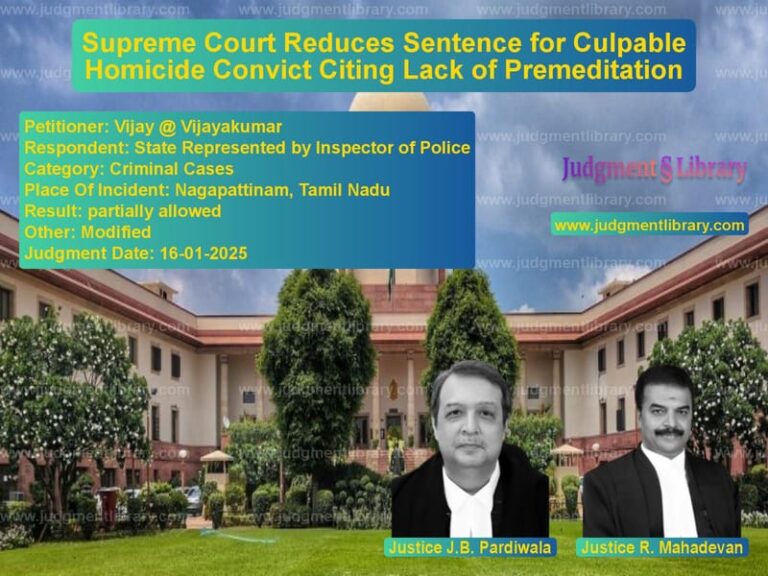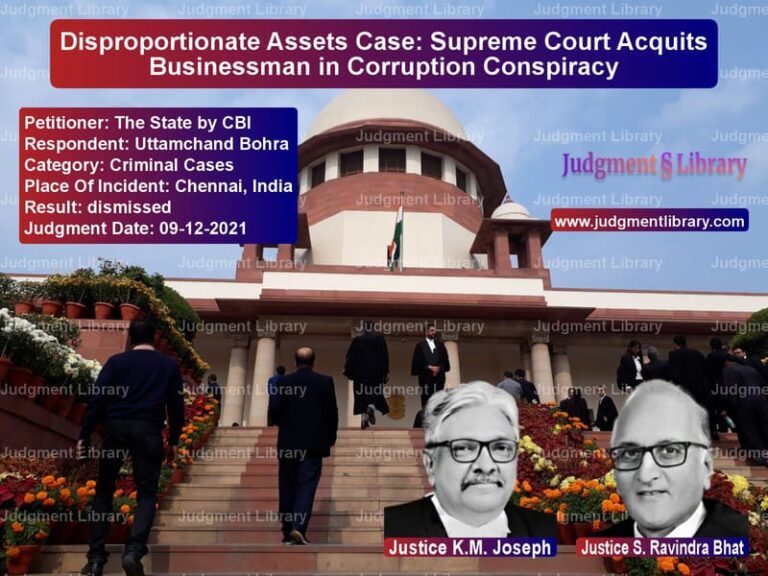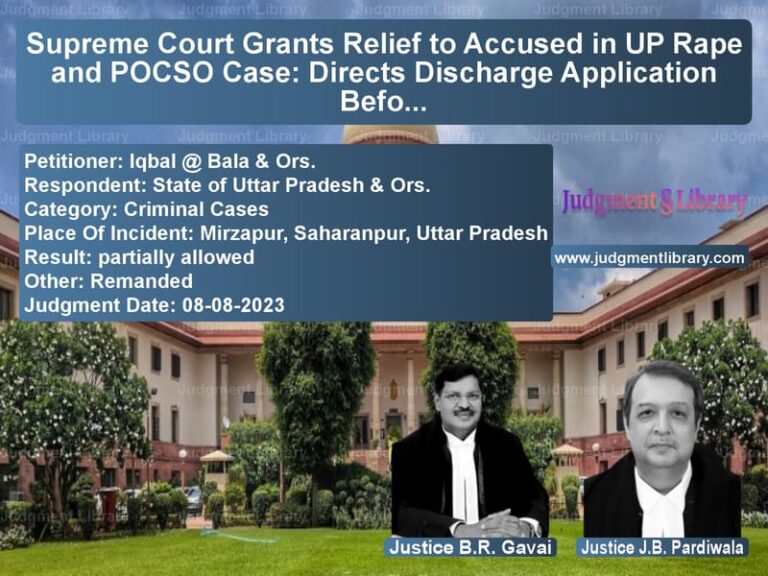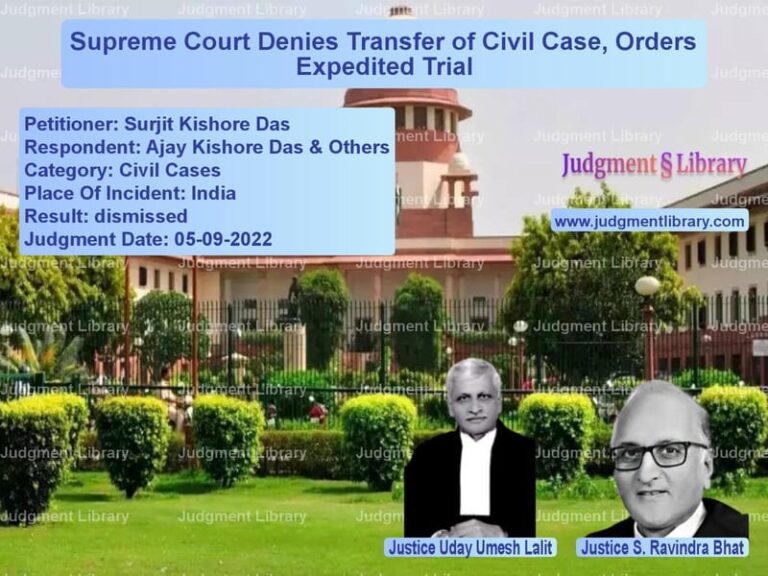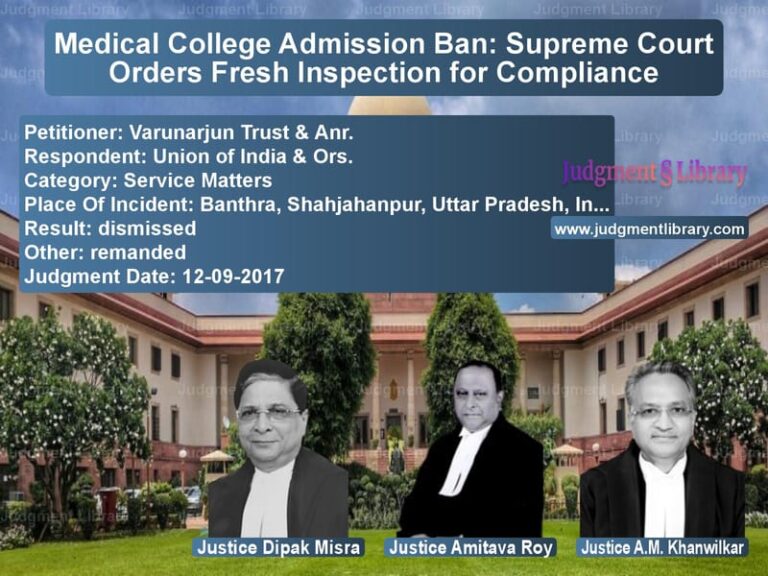Conviction Upheld but Sentence Reduced in Railway Property Damage Case
The Supreme Court of India recently ruled on an appeal in the case of Nagaraj vs. Union of India, which involved the conviction of a Karnataka State Road Transport Corporation (KSRTC) driver for damaging a railway crossing gate. The case was significant in interpreting Section 160(2) of the Railways Act, 1989, which provides for imprisonment for breaking railway gates. While upholding the conviction, the Supreme Court reduced the sentence, considering the nature of the offense and the time elapsed.
Background of the Case
The appellant, Nagaraj, was working as a bus driver with KSRTC. On August 3, 2006, around 11:15 PM, while driving a bus, he hit and damaged a railway crossing gate at KM No. 350-5-6, which was located between Chalageri and Ranebennur Railway Stations. As a result, an FIR was registered against him the next day (August 4, 2006) at the RPF Police Station, Ranebennur.
The prosecution charged Nagaraj under Section 160(2) of the Railways Act, 1989, which states:
“If any person breaks any gate or chain or barrier set up on either side of a level crossing which is closed to road traffic, he shall be punished with imprisonment for a term which may extend to five years.”
Trial Court Conviction
The case was heard by the Principal Civil Judge and First Additional JMFC, Ranebennur. On April 5, 2011, the Trial Court found Nagaraj guilty and sentenced him to six months of simple imprisonment. The court ruled that the prosecution had successfully established that the appellant had caused damage to railway property by negligently driving the bus into the gate.
Appeal Before the Sessions Court
Nagaraj appealed his conviction before the Additional District and Sessions Judge, Haveri. The Sessions Court, on March 4, 2016, upheld the Trial Court’s decision, maintaining both the conviction and the sentence. The appellate court concluded that the evidence presented was sufficient to establish the accused’s guilt beyond a reasonable doubt.
High Court Revision
Following the dismissal of his appeal, Nagaraj filed a criminal revision petition before the Karnataka High Court, Circuit Bench at Dharwad. The High Court, in its order dated March 15, 2018, rejected the revision plea, affirming the lower courts’ decisions. The High Court held that there was no reason to interfere with the concurrent findings of the two lower courts.
Arguments Before the Supreme Court
Nagaraj, through his counsel, presented three primary arguments before the Supreme Court:
- Insufficient Evidence: The appellant argued that there was not enough evidence to convict him under Section 160(2) of the Railways Act. He claimed that the prosecution failed to prove that he had intentionally or negligently caused damage to the railway property.
- Disproportionate Punishment: It was contended that the six-month jail sentence was excessive and disproportionate to the nature of the offense. The appellant pointed out that no injury was caused to any individual, and the damage was limited to the railway crossing gate.
- Probation Request: The appellant also requested that he be released under the Probation of Offenders Act, 1958, given that he was only 21 years old at the time of the incident and had already served one month of his sentence.
Supreme Court’s Judgment
After considering the arguments, the Supreme Court ruled as follows:
- Conviction Upheld: The Court rejected the argument of insufficient evidence. It noted that all three lower courts had found Nagaraj guilty based on consistent evidence, and there was no reason to interfere with these findings.
- Sentence Reduced: While upholding the conviction, the Court reduced Nagaraj’s sentence to “what he had already undergone”. The Court reasoned that:
- The offense did not involve any injury or harm to a person but only property damage.
- The appellant had already served one month in jail.
- The offense had occurred 13 years ago, and further imprisonment would serve no meaningful purpose.
The Supreme Court ruled:
“The offense in question is neither against society nor does it involve moral turpitude. It has not resulted in causing any harm or injury to any human being except for damage to railway property, i.e., one railway crossing gate. Considering these factors, we alter the sentence to what the appellant has already undergone.”
Accordingly, the Supreme Court ordered that Nagaraj be released immediately as he was no longer required to serve additional jail time.
Impact and Significance of the Judgment
The judgment in Nagaraj vs. Union of India highlights several key principles:
- Judicial Discretion in Sentencing: The Court balanced the need for upholding the law with the principle of proportionality in sentencing.
- Limited Scope for Appeal in Concurrent Findings: The judgment reiterated that when lower courts have consistently upheld a conviction based on clear evidence, the Supreme Court rarely intervenes unless there is a glaring error.
- Consideration of Time Factor: The ruling reflects a practical approach, considering the passage of time and the minor nature of the offense.
- Recognition of Non-Violent Offenses: The Court acknowledged that cases involving property damage should not necessarily be treated as harshly as those involving physical harm to individuals.
Conclusion
The Supreme Court’s decision in Nagaraj vs. Union of India is a balanced judgment that upholds the law while ensuring that the punishment is fair and proportionate. By maintaining the conviction but reducing the sentence, the Court has reinforced the principle that justice should be tempered with mercy when warranted. This ruling serves as an important precedent for future cases involving non-violent offenses under the Railways Act and similar statutes.
Petitioner Name: Nagaraj.Respondent Name: Union of India.Judgment By: Justice Abhay Manohar Sapre, Justice Dinesh Maheshwari.Place Of Incident: Ranebennur, Karnataka.Judgment Date: 21-02-2019.
Don’t miss out on the full details! Download the complete judgment in PDF format below and gain valuable insights instantly!
Download Judgment: Nagaraj vs Union of India Supreme Court of India Judgment Dated 21-02-2019.pdf
Direct Downlaod Judgment: Direct downlaod this Judgment
See all petitions in Negligence Claims
See all petitions in Road Accident Cases
See all petitions in Judgment by Abhay Manohar Sapre
See all petitions in Judgment by Dinesh Maheshwari
See all petitions in partially allowed
See all petitions in Modified
See all petitions in supreme court of India judgments February 2019
See all petitions in 2019 judgments
See all posts in Criminal Cases Category
See all allowed petitions in Criminal Cases Category
See all Dismissed petitions in Criminal Cases Category
See all partially allowed petitions in Criminal Cases Category


